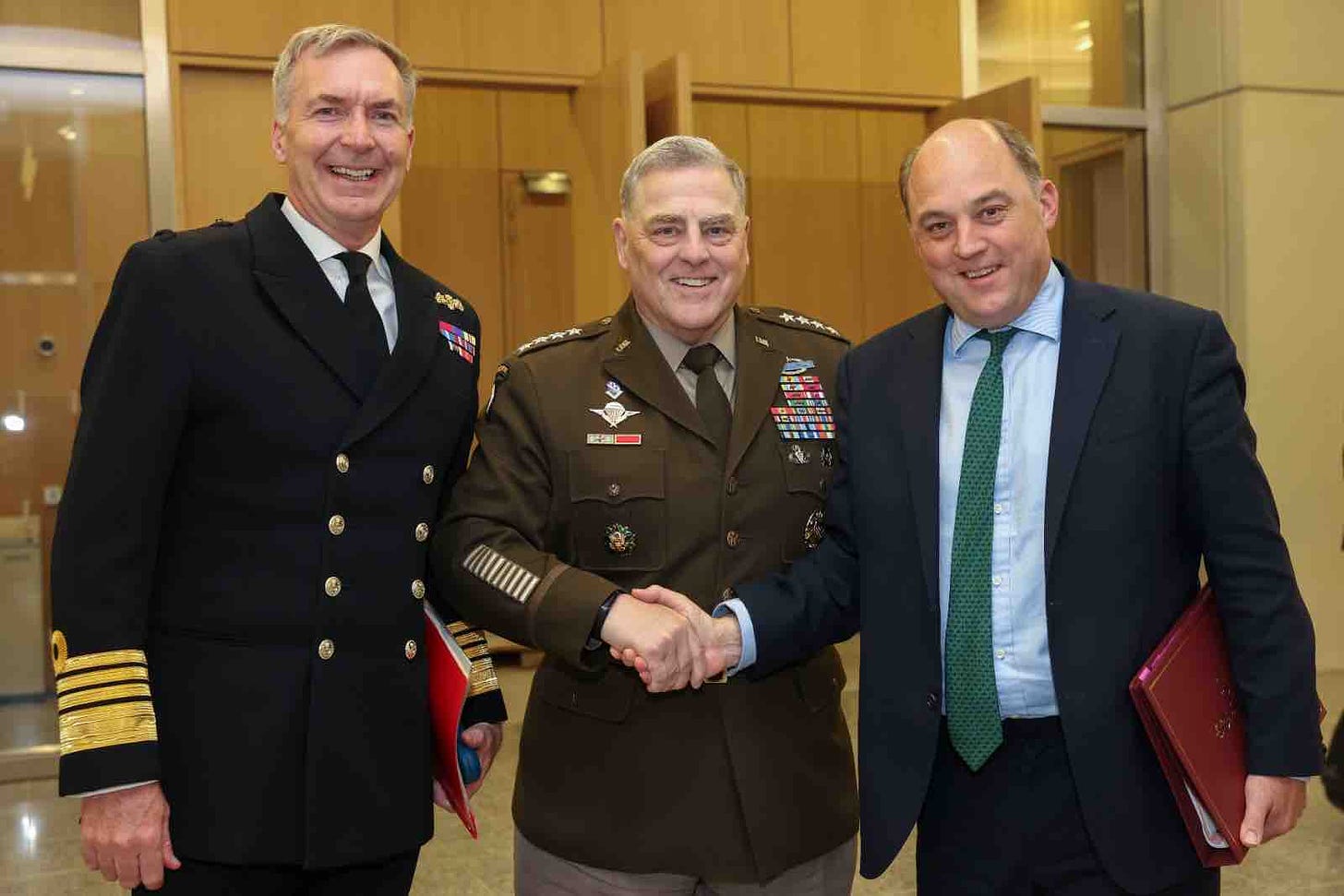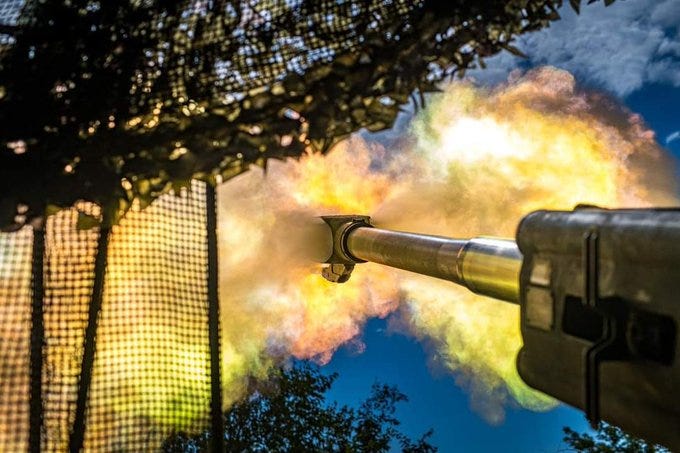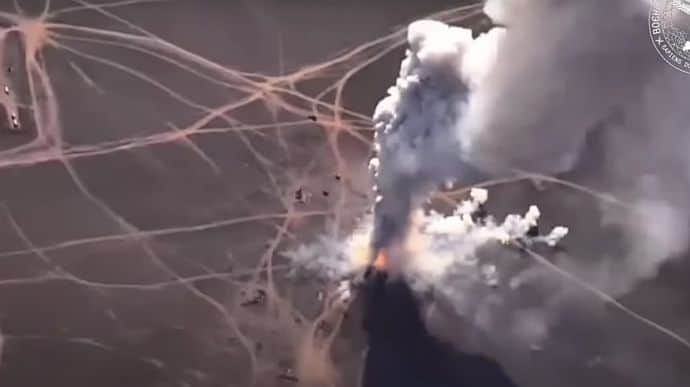Ukraine has continued to adapt its capabilities as weapons and available forces present them with opportunities.
The most accurate description may be hybrid, as their own - sometime bitter - experience combined with the latest weapons and training are weakening Russian defenses both at the front and in the rear, forcing the Russians to redeploy troops to the Zaporizhzhia front even as Ukrainian advances there limit the impact of those transfers. JL
Phillips O'Brien reports in his substack:
People (eg, US and British military officers) would not be trying to claim credit for Ukrainian strategy if intelligence were not showing things are going well for Ukraine. Ukrainian forces have made tactically significant gains in Zaporizhia, and are advancing through the most challenging prepared Russian defensive positions. Russian artillery has been weakened, allowing Ukraine to hit Russian forces hard. Ukrainian forces have entered areas where they encounter only Russian ”logistics groups" and expect further breakthroughs will be easier. The Russians are stretched and having to move forces from other parts of the front line (not reserves, redeployments) because they are suffering.I think this week’s weekend update is going to be a little pointed. It starts with what seems to be one of the most naked credit grabs in this war, US and UK officials trying to claim credit for Ukraine’s successes. The only good news is that its a sign that Ukraine is having success. Beyond that, its terribly depressing.
The Shameful Credit Grab for Ukrainian Success
“Victory has many Fathers but defeat is an orphan”. This is one of the most well-known phrases about how humans react to war (and many other things in life). The desire to take credit for success and push the blame onto others is something that I have seen throughout the study of other wars. It emerges from some desperate need to protect reputations and create (usually false) ideas of genius. In World War II, there were great examples of this both ways. German generals, for instance, always had Hitler to blame for their mistakes, and started a chorus almost immediately after the war which said if only they had been listened to—Germany could have won the war (hint—it could not).
In the US, I would argue, an opposite event took place. Much of the success of US grand strategy was given to General George Marshall, as process that started after Franklin Roosevelt died (Truman was much more positive about Marshall than Roosevelt). Actually, before 1944, Marshall lost all the important grand strategic fights in the US government. He wanted to force the US Navy to convoy in early 1942 (they did not), he violently opposed the invasion of North Africa in late 1942 (Roosevelt simply overruled him and told him to do it), He wanted to invade France in 1943 (he was outmaneuvered on this by the British and the rest of the joint chiefs) and he wanted to build a large US land army (Roosevelt said no). Yet, after losing fight after fight (here is a game—try to name one great strategic fight within the US government that George Marshall won before 1945), he triumphed in the reputational war afterwards. That, unfortunately, is often how history works.
What we have witnessed in the Ukraine war over the last week is far more egregious and unseemly than anything I’ve studied in World War II (except for maybe the credit grabbing by Douglas MacArthur), and one that does no credit to the first American and now British sources that are desperately (and anonymously of course) trying to claim credit for somehow convincing the Ukrainians to change strategy. Its also fascinating the shamelessness with which the new narrative was being pushed.
If you recall, over a week ago (I talked about it in last week’s update) the anonymous stories were all about how slow the Ukrainians were going and how it was because they refused to fight in the NATO fashion that the Americans were telling them to do.
Well guess what—almost immediately after these stories appeared it became clear that perhaps, just perhaps, the Ukrainians were having some success. At that point, instead of throwing the Ukrainians under the bus (the previous strategy) the anonymous sources pivoted 180 degrees and tried to create a new narrative which argued that any success the Ukrainians were having was not really a Ukrainian success, it was the result of the Ukrainians being pushed into line by the strategic brilliance of the US and UK.
It started 5 days ago, in a story in the New York Times. Now, instead of simply rubbishing the Ukrainians for not having success, the anonymous sources tried a completely new line. Ukraine was having some success—but it wasnt down to the Ukrainians. No, it was the result of the US pushing the Ukrainians to do what the US wanted to do. In the US narrative, General Milley was the hero of the day. Here is a quote from the story.
In a video teleconference on Aug. 10, Gen. Mark A. Milley, the chairman of the Joint Chiefs of Staff; his British counterpart, Adm. Sir Tony Radakin; and Gen. Christopher Cavoli, the top U.S. commander in Europe, urged Ukraine’s most senior military commander, Gen. Valeriy Zaluzhnyi, to focus on one main front. And, according to two officials briefed on the call, General Zaluzhnyi agreed.
And then a few days, the Brits jumped in. Not wanting the US to get all the credit for Ukrainian successes, now British (anonymous) sources claimed it was the silky skills of the UK’s Chief of the Defence Staff, Admiral Radakin, that convinced the Ukrainians to stop the stupid way that they were fighting and to change course and have some success. Using the worst kinds of weasel words, a source took credit for the British without trying to look like it was taking credit.
British sources are reluctant to say much about the outcome of the meeting at the border. But the indications from the west is that the strategy has changed as a result of the discussions. “I think you can see they are focusing on the Zaporizhzhia front,” said one insider, amid reports of fresh Ukrainian attacks aimed at the city of Tokmak, an initial step towards reaching the Sea of Azov, thereby cutting the land bridge to Crimea.
On the one hand, such anonymous credit grabs are entirely to be expected. You dont reach the top of the US and UK militaries normally unless you have a keen sense of public relations and an ability to garner credit for others’ successes. You also need the ability to charm your political masters (or convince them that you are pliant enough to give them everything that they ask for). This doesn’t apply to all that reach the absolute top—but its depressingly regular. Indeed, what I have often seen is that the really great officers usually end their careers one or two wrungs down from the absolute top. They are either too intelligent or too willing to challenge current wisdom to get the top job. They truly great ones lack the oleaginous quality of those who often get to the very top.
Now, the Ukrainians have been watching this credit grab with great disquiet—and started to counter it almost immediately. General Zaluzhny gave an interview to the Wall Street Journal in which he deliberately attacked the notion that somehow the Ukrainians needed to listen more to outside militaries telling them how to fight Ukraine’s war.
Zaluzhny first took on all the doomers of more than a week ago (before the great credit grab started) by saying that indeed the counteroffensive was progressing and a ‘breakthrough’ might soon be in the offing. He then also through some serious cold water on the notion that the advice he was receiving was the source of any Ukrainian success. Indeed, he cast a little ‘shade’ back on the Pentagon sources by saying that what the Ukrainian forces were fighting resembled the Battle of Kursk, and had little resemblance to the counterinsurgency operations that have basically consumed the US Army over the last 22 years.General Syryski also fired back yesterday. One of the great hallmarks of the credit grab coming out of Washington and London is that the Ukrainians were sending too many forces to protect their eastern flank against Russian attacks, and that they should throw everything into one large attack in Zaporizhzhia. Syryski was even more direct that Zaluzhny. In an article, that also had Zelensky responding aggressively to US critics of Ukrainian strategy, Syrskyi attacked the US analytical community.President Volodymyr Zelensky of Ukraine responded bluntly to the American criticism this past week, saying that shifting Ukrainian forces away from places like Kupiansk, in the Kharkiv region, is what Russia is trying to accomplish.
“We will not give up Kharkiv, Donbas, Pavlohrad or Dnipro. And that’s that,” he said during a news conference on Wednesday according to the Ukrainian Pravda news outlet. “And let all the analysts in the world not even count on it.”
In speaking with Ukrainians I can say that right now there is a great deal of bitterness at both how they were first thrown under the bus by the anonymous sources and then to turn around and see those same sources try and claim credit for their success. What they are saying in public is restrained. After the war, they will probably be even more direct.
As for those trying to grab credit. Assuming that General Milley and Admiral Radakin are not part of this effort—it is incumbent on the two of them to end this effort now. It dishonors both of them and will tarnish their historical reputation.
Why cant people understand that this is Ukraine’s war and the Ukrainian high command is fighting a clear and consistent way and has been since late June? Its just now starting to create signs of success on the map (it was working before, it just needed time to waste Russian resources). People sitting behind desks with no command responsibility in this war cant understand the choices the Ukrainians have to make. Let them do it, and dont try to grab their credit.
The Good News: Signs of Success
The one good story to come out of this desperate need to claim credit in Washington and London is that there is now a real awareness that the Ukrainians have a chance of significant success. Believe me, people would not be trying to desperately claim credit for Ukrainian strategy if intelligence reports were not showing that things were going well for Ukraine. In a nutshell, there are signs that the Ukrainian strategy which they have been following fore more than two months (over the early criticisms by US/UK sources and the analytical community) is starting to work. That strategy has been to concentrate on weakening Russian forces considerably, to create the conditions for a later Ukrainian advance. The Ukrainians realized Russian lines were too well defended in June, and they (not surprisingly) had no desire to suffer extreme losses battering themselves against those lines.
This week an excellent description of Ukrainian strategy was given by the Ukrainian analyst Mykola Bielieskov (people who know my work, know how much I rate his work). Mykola clearly outlines this strategy of attrition and force preservation.
Here are a few excerpts (link to the whole article in the footnotes).But from the Ukrainian perspective that was adopted in mid-June, we saw that using mechanized assaults would not quickly penetrate Russian defenses. So we started a slow attrition process to undermine their defense system based on artillery, electronic warfare, and air defense. We see daily evidence that this is working by destroying dozens of Russian artillery pieces. This campaign of destruction is proving effective.”
and
“That’s why we decided to start from different sides. First, to destroy tube and rocket artillery and then move safely to the mines, instead of trying to breach the mines without fully suppressing Russian artillery. That’s the essence of the new Ukrainian approach: Ukraine placed its bets on a proper attrition rate, creating a safe environment for demining and then moving on.
But this is only one part of this approach. There are also in-depth strikes targeting links between the South Mainland and Crimea. And another one is simultaneously pinning as many Russian forces as possible to prevent Russians from maneuvering reserves, which is why they currently have this problem with the deficit of reserves.
Even as we see recently, they redeployed some paratroopers from Kherson Oblast to the Zaporizhzhia Oblast. And that’s why we try to prevent their maneuver and again to exhaust the Russians sooner than they exhaust us.”
Its amazing that Mykola’s clear and logical analyses are rarely quoted in the major western press, whereas failed analysts who have consistently overrated Russian capabilities and damned Ukrainian ones, get mentioned all the time.
Ukraine did not change this strategy after listening to Milley and Radakin on August 10 (if they did, they hardly could have reacted so quickly as to start having success right away), its just what they were doing was having some success. Ive been banging on about this strategy for months.
Russian artillery has been weakened, and this has allowed the Ukrainians to start hitting Russian forces hard (thanks DPICM). Now its the Russians that are getting stretched and having to move forces from other parts of the front line (these are not reserves, they are redeployments) because they are suffering.
Always keep in mind that success on the battlefield does not happen overnight. I say that with emphasis because its so weird that people look at what is happening like somehow Ukraine flipped a switch few days ago and started doing better. What we are seeing now started months ago, as has come about because of Ukrainian strategy.
If you want to have a decent outline of the success the Ukrainians are having, the Institute for the Study of War has gone into it in great detail. Please take a look at their update from this morning.
Here is the opening paragraph.Ukrainian forces have made further tactically significant gains in western Zaporizhia Oblast, and several Ukrainian and Russian sources reported that Ukrainian forces are advancing through what Ukrainian and US sources suggested may be the most challenging series of prepared Russian defensive positions. Geolocated footage published on August 25 indicates that Ukrainian forces advanced 1.5km southward northeast of Novoprokopivka (13km south of Orikhiv).[1] US Chairman of the Joint Chiefs of Staff General Mark Milley stated on August 25 that Ukrainian forces are currently attacking through the main set of Russian defensive preparations along the axis of Ukrainian advance.[2] Reuters reported on August 26 that a Ukrainian commander fighting in southern Ukraine stated that Ukrainian forces believe they have broken through the most difficult line of Russian defenses in the area and will now be able to advance more quickly.[3] The Ukrainian commander reportedly stated that Ukrainian forces have entered areas where they encountered only Russian ”logistics groups" and that he expects that further Ukrainian breakthroughs in these areas will be easier.[4] A Russian milblogger claimed on August 25 that Ukrainian forces were attacking in the direction of rear defensive lines near Verbove (18km southwest of Orikhiv), suggesting that Ukrainian forces may be near tactical rear areas within the series of Russian defensive positions that they are currently penetrating - though these reports should not be misinterpreted to indicate Ukrainian forces have entered Russian rear areas at the operational level.
I will go more into what this success might mean in my midweek update. If you want to read a really interesting take, however, you could also read this article by Jan Kallberg that I tweeted out a few days ago.
https://twitter.com/PhillipsPOBrien/status/1695080451193409703?s=20
Comparing Militaries
Last point, and it will be short (this looks like quite a long update). The Ukrainians pulled off an extremely impressive operation this week, when they destroyed a Russian S-400 anti air system which was based in Crimea. The S-400 is Russia’s most advanced anti air system. Ukrainian intelligence even released a video of the operation which was filmed by a UAV lurking nearby.
https://twitter.com/DI_Ukraine/status/1694289486073524483?s=20
The S-400 was, according to the Ukrainians, destroyed by one of their homegrown systems, an adapted Neptune anti ship missile.
So many things of this operation stand out and indicate a military that is adaptable fighting one that is struggling to keep up. First, the Ukrainians filmed the whole thing! There is something remarkable about the Ukrainian ability to spoof the Russians to such a degree that over Crimea they can film an attack on an extremely valuable Russian target.Then there is the fact that they are able to target a S-400 (and anti-air system) and take it out with a missile. Where are the layers of Russian defense? This is Crimea, which the Ukrainians are attacking more and more from the air, and the Russians let this happen? Finally, there is the fact that this is a homegrown system. If the Ukrainians can start producing these at scale, Crimea will be in even more trouble.
Compare this to Russian attempts to target Ukraine’s Patriot systems. These are older US systems, which have been invaluable in the defense of Kyiv for instance. The Russians are desperate to hit the Patriots, and have tried numerous times with some of their most advanced systems. They have failed repeatedly.
Its one of the reasons I’ve always been optimistic about Ukrainian prospects. Time and time again they show adaptability and the ability to execute complex operations. The Russians still struggle in these areas.
























2 comments:
The critics and naysayers are not gone yet. Just one apparent lull, or one costly battle and they'll be back. They'll be asking why can't Ukraine give up some of its land for peace.
It's like asking the US to give Alaska back to Russia so it can be appeased and save face. After all, wasn't Russia suckered out of Alaska for almost nothing? Foxnews, has plenty of propagandist repeating over and over that Ukraine is losing. The Republican president wantabes have shown how little they understand Russian imperial desires and determination to make war on its neighbors. Putin is todays Hitler and the candidates
don't seem to understand the danger to the US and the free world.
Agreed, anonymous
Post a Comment